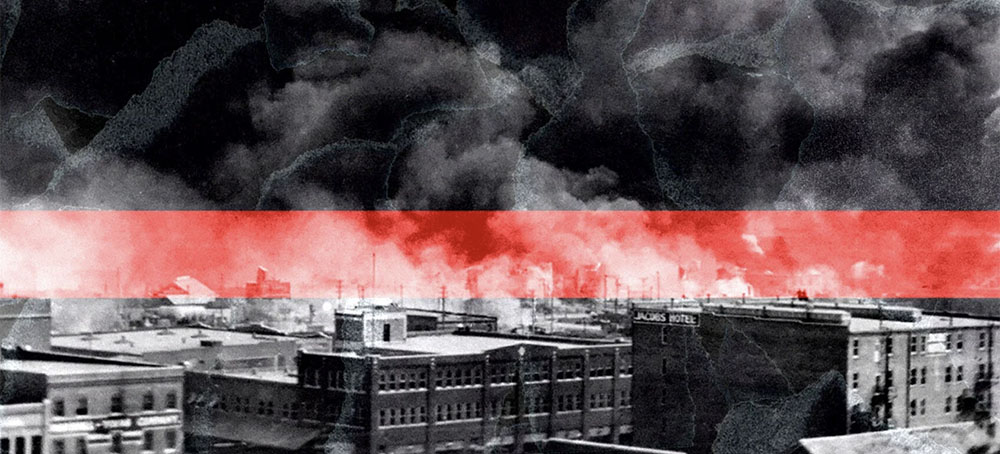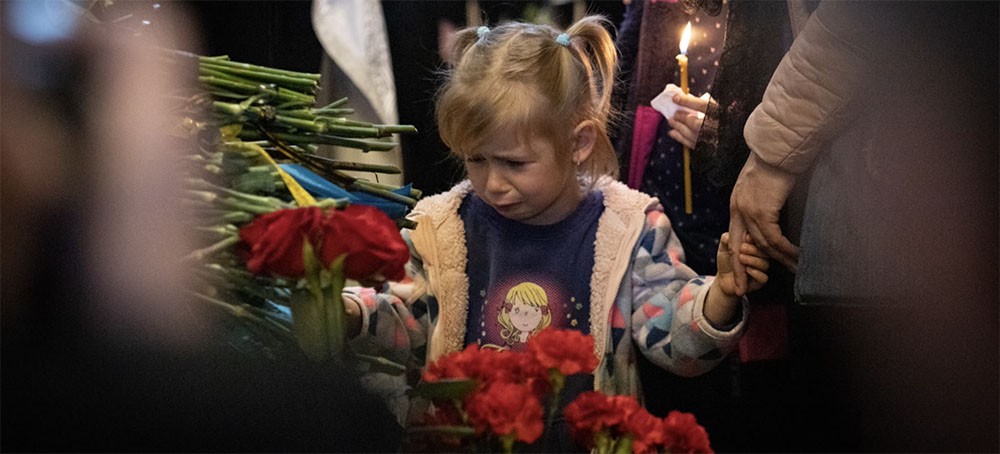We Will Fight for a Budget, You Can be Sure
We fight battles every single day against profound forms of injustice. We know how to fight. A lot of people are taking advantage of our small organization. We absolutely will put up a fight.
Stay on the right side of that.
Marc Ash
Founder, Reader Supported News
If you would prefer to send a check:
Reader Supported News
PO Box 2043 / Citrus Heights, CA 95611
Follow us on facebook and twitter!
Live on the homepage now!
Reader Supported News
Jason Johnson: How did you become the attorney for the survivors?
Damario Solomon-Simmons: After the massacre ended—about 24 hours of destruction—people started filing lawsuits. B.C. Franklin, a famous lawyer, there’s a famous heartbreaking picture of this lawyer and his law partner and his legal clerk, practicing law after the massacre in a tent with whatever remaining law books he had, because everything else had been destroyed and burnt down. And so lawsuits have been filed since that day, over 100 or so lawsuits, and they’ve all been dismissed.
I’m an eighth generation Oklahoman. My family’s been here since the Trail of Tears, [with] Black Creek ancestry. I didn’t know anything about the massacre. I went to school on Greenwood Avenue at Carver Middle School. I went to school at Booker T. Washington High School, the pride of Greenwood in North Tulsa, and I didn’t know anything about the greatness of Greenwood, or the massacre, until I went to play football at the University of Oklahoma. In the Intro to African American Studies class Dr. Kepper Nurhakim’s talking about this great community in Tulsa, and what all these Black folks had done, and I’m sitting there thinking, ‘this guy doesn’t know what he’s talking about.’ And I raised my hand and I said, “Man, you don’t know what you’re talking about, this is my community.”
Of course I was wrong. He gave me all the smoke, embarrassed me. And from that day, that was 24 years ago, I’ve been obsessed with learning as much about Greenwood and trying to get justice for Greenwood. At that time, we had over 150 living survivors that we were able to find, and I got a chance to really spend time with so many of these survivors. And many of these survivors I knew my whole life. I didn’t know they were survivors. They had never talked about it, because for 75 years there was a conspiracy of silence.
So this was the early 2000s. [A] case was filed in 2003. It was dismissed, I believe, based on racism—the legal reasoning was statute of limitations.In 2005, we go to the United States Supreme Court, and they dismissed us “without comment.” Then we started working on trying to get legislation, 2005, 2006, 2007. I testified at Congress, I traveled again to D.C. with survivors, and we finally got a bill introduced by the late great Rep. John Conyers. We worked really close with him, he filed a bill, we had a hearing in 2007. It was a little known Indiana representative that was at the hearing that said, “This is really bad, and I feel for you from a moral standpoint, but this is just too long ago.” You might have heard of this guy, his name was Mike Pence.
And so our bill didn’t go anywhere. It was introduced for seven years straight, to 2014, it didn’t go anywhere, it didn’t go anywhere, and our survivors were dying, dying, dying, dying. So we were down to less than 10 or so known survivors around 2016. At this time I’m 15 years into my career. I’m writing blogs, I’m still traveling the nation talking about this issue, giving presentations, but it’s like—what can we do to actually get real justice?
And 2019, in May, the Tulsa Chamber of Commerce, knowing that the 100-year Centennial was coming, decided to put together this marketing plan to say that Tulsa’s moved on. They called it #TulsaTriumphs. That infuriated me to a point I said, I’m going to file a lawsuit, I don’t care if I have a theory or not. We pulled together a couple of the older lawyers, and we started researching, and then we looked at this opioid case that the state of Oklahoma was utilizing, the Oklahoma Public Nuisance Statute. That statute is 112 years old, from 1910. And we looked at the statute and we said, we fit right perfectly in this; we can do this. And we researched that claim for a year, and we filed this current lawsuit in Sept. 1, 2020.
Most people thought this was crazy, this was novel, we were just trying to get publicity, but we believed that this claim was a good, solid legal claim, and we litigated over the last 18 months or so. The defendants tried to kick us out of court. On May 2 we made history. For the first time in over 100 years, a lawsuit for survivors and descendants related to the Tulsa race massacre is going to move forward in some form or fashion.
You mentioned something in here that I want to make sure we get to as well, this idea of you’re collecting stories and information. What information are you still looking for, and who’s trying to stop you? Are you still trying to find minutes from white city council meetings at the time, are you trying to find out what’s the airfield that the bombers were launched from? What’s the information you’re finding, and what’s the hold up?
All of the above. I know because of the last couple of years with Watchmen and Lovecraft [Country], and Trump coming to Tulsa and the Centennial, this has gotten a lot of airplay, and a lot more people have learned, at least know it happened. First of all, it’s still a significant amount of people that don’t know anything about it, and then there’s still, I mean, we probably only have about 3-5 percent of all the information that’s available, because [of] the white institutions who perpetrated the massacre. I’m going to be very clear this was state sponsored. It was the white government entities that deputized thousands of white men, and they armed them.But they have hid the information for 100 years, they have hid the fact of their involvement. We want to know the names of the perpetrators.
We know that our survivors told us how many times they would go into the homes of white Tulsans as a repair person, as a domestic, as a delivery person, and they would see things that were stolen from their home, stolen from their neighbor, stolen from their businesses. We want to know where that is, that’s why we want to know everything about the massacre. We want to identify every family and individual that was impacted by the massacre. We want to know every individual that perpetrated the massacre, and we want those who perpetrated it to be held responsible, and when I say those, I’m talking about the entities that are still living today, the perpetrators of the massacre, the City of Tulsa, and the Tulsa Chamber of Commerce, the Tulsa County Sheriff’s Office, Tulsa County Government, the Oklahoma National Guard, Tulsa Development Authority, and Tulsa Metropolitan Planning Area Commission. They perpetrated the massacre and the 100 plus years of continuing harm, and we want them to be held accountable.
So Damario, last year was the 100-year anniversary of the attack on Greenwood. Last year the president comes and gives a speech, he talks about what happened, he says the massacre was a shame, and then he makes Juneteenth a federal holiday. What did you think of the federal response to your lawsuit that you saw during the anniversary last year?
Well, I’m going to answer that question by quoting, or paraphrasing, my client, 101-year-old Hughes Van Ellis, who said a couple weeks ago to me: “I’m just so disappointed in President Biden, because he sat with me, and he promised me he would do everything in his power to make sure I, and our community, gets justice, and he’s done nothing.” He’s a World War II survivor, a combat veteran, and he proudly met President Biden. He told him, “I voted for you, I believe in you, I believe you’ll bring justice,” President Biden said to his face, “I’m going to do everything in my power,” and then he’s done nothing. He’s done zero.
For my clients, when they see how quickly the president and Congress can move to send $40 billion plus over to Ukraine, they’re devastated. How is it that our government, in a matter of days, can marshal billions of dollars, can go and visit, can do everything for Ukraine, but in over 100 years, almost 101 years next week, have not done one thing for Tulsa, haven’t provided one penny for Greenwood, have not provided any level of justice for survivors and descendants in this community.”
It is insulting, it’s infuriating, it’s grotesque, and it’s something that is just so… I’m trying to contain myself because as I think about that I think about Buffalo, and I think about the performative actions that’s going to happen, and people going to go and make speeches, but they’re not going to do anything. They’re not going to pass any particular policy, they’re not going to double the budget to stop domestic terrorism, they’re not going to provide reparations and restorative justice for those families, they’re not going to expel the members of Congress who are known open white supremacists—that they could do under the 14th amendment. They’re not going to sign an executive order to say, you know what, Congress, if you won’t do this, I’m going to utilize my executive power to give justice to Greenwood, to give justice to these survivors, or to do anything besides give a speech.
So that’s how I feel about it, that’s how my clients feel about it. These people are 108, 107, and 101 plus. They’ve lived through everything, and nothing has changed. We are still trying to get the Department of Justice to open an investigation into the largest crime in the history of this country. It’s the largest crime scene, when you’re talking about modern American history. The largest crime scene is in Tulsa, Greenwood, and has never been investigated by any law enforcement agency.
Special Coverage: Ukraine, A Historic Resistance
READ MORE
Follow us on facebook and twitter!
PO Box 2043 / Citrus Heights, CA 95611






